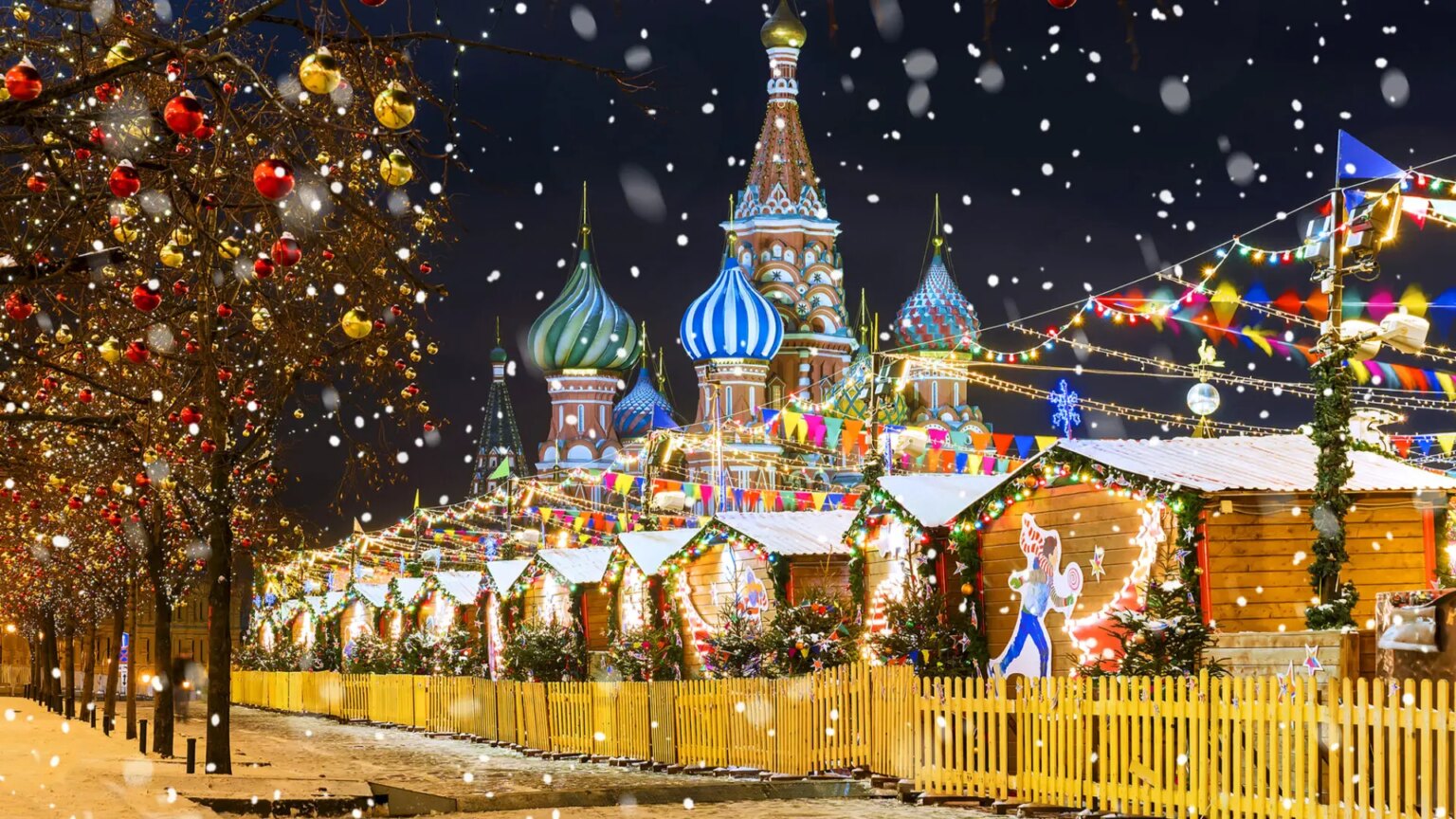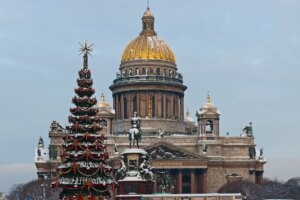Important notice from the Editor in Chief
Maintaining our Russian site is a delicate matter during the war. We have chosen to keep its content online to help our readers, but we cannot ensure that it is accurate and up to date. Our team endeavors to strike the right balance between giving information to those who need it, and respecting the gravity of the situation.
Traditional Russian festivals celebrate religious occasions such as Easter and Christmas plus historical and political events. Sprinkled in are summer music festivals and events celebrating food, film and theater – and, of course, snow and ice. Here’s an interesting mix of some of the best festivals and celebrations in Russia.
- 7 January: Russian Orthodox Christmas
- 25 January: Tatyana’s Day
- January: International Festival of Snow and Ice Sculpture, Krasnoyarsk
- February: Maslenitsa Festival
- 8 March: International Women’s Day
- April: Moscow International Film Festival
- March/April: Golden Mask Theater Festival, Moscow
- May-July: White Nights Festival, St Petersburg
- 9 May: Victory Day
- June: Scarlet Sails, St Petersburg
- June: Ivan Kupala Night
- June: Taste of Moscow
- June: Wild Mint Folk Festival
- July: Nashestvie, Moscow
- August: Afisha Picnic, Moscow
- Early November: Day of Accord and Reconciliation, Moscow
- Mid-December to mid-January: Russian Winter Festival
- December/January: New Year
- Throughout the year: Chekhov International Theater Festival, Moscow and beyond
7 January: Russian Orthodox Christmas
Along with other religious celebrations, Christmas was banned in Russia after the 1917 Revolution. Russians could only openly observe Christmas in 1992. The Russian Orthodox church – and almost all Russians – celebrate Christmas (the birth of Jesus) on 7 January. It’s mainly a religious occasion, when families gather together to attend church services on Christmas Eve (6 January). They then go home to feast on a special holy supper, which includes kutia, a porridge with raisins. Some people attend all-night vigils at church; others just go on Christmas morning.
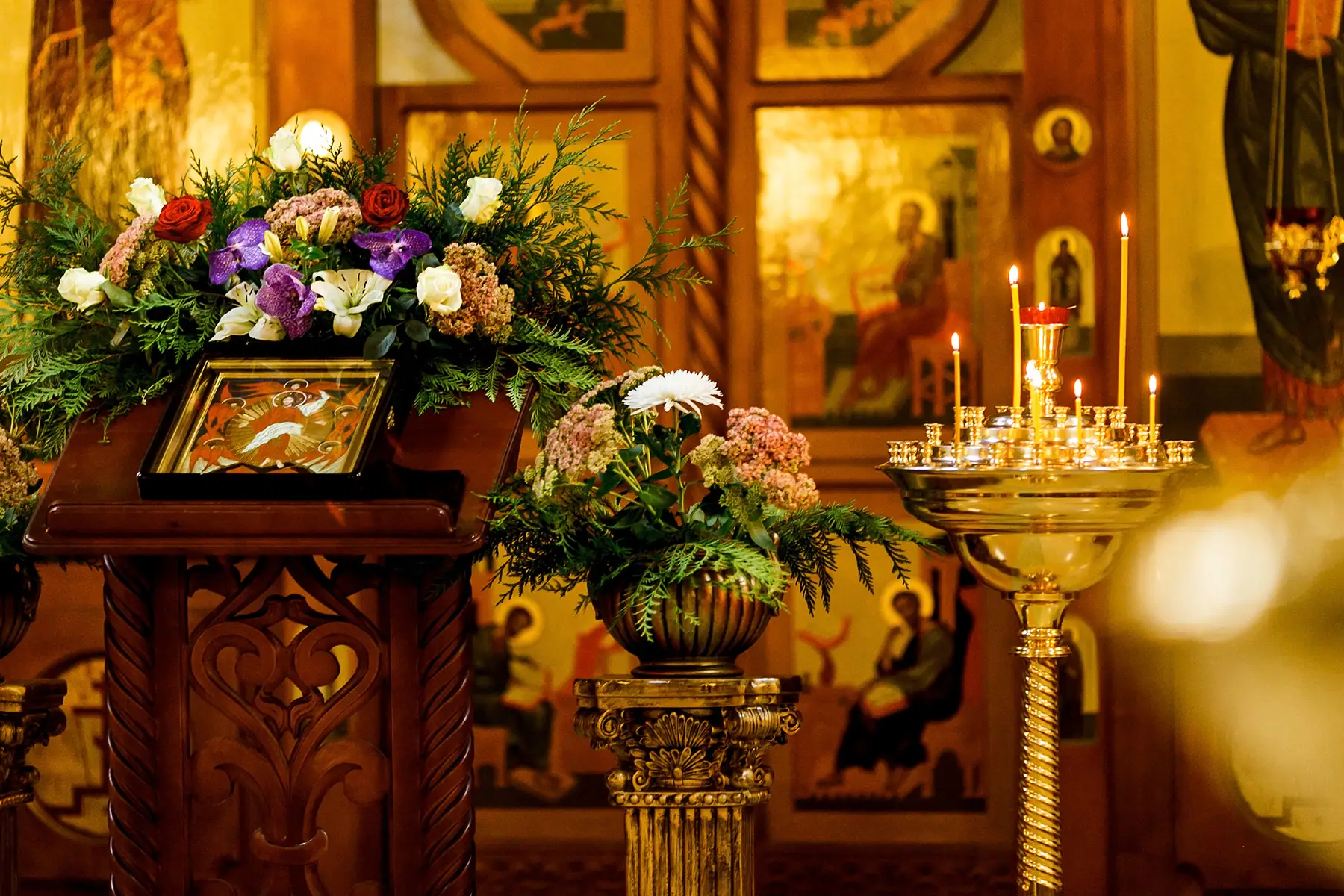
25 January: Tatyana’s Day
Tatyana’s Day is Russian Students Day. When Elizabeth, Empress of Russia signed a decree to establish Moscow State University on 25 January 1755 – the saint’s day of third-century Christian martyr St Tatyana – St Tatyana became the patron saint of students. Most university towns have St Tatyana celebrations, holding balls and choosing the best Tatyana from the students.
January: International Festival of Snow and Ice Sculpture, Krasnoyarsk
The Magic Ice of Siberia is an international competition on the banks of the Yenisei River in Krasnoyarsk. Teams of sculptors, architects, and artists create massive frozen artworks to compete in two categories: snow and ice.
February: Maslenitsa Festival
Seven weeks before Easter are the week-long Maslenitsa festivities – Russia’s pancake week. They combine the pagan tradition of marking the transition from winter to spring with the Christian tradition of feasting before Lent. Each day there are different activities: making Maslenitsa dolls from straw and old clothes, making and eating lots of pancakes (blinis), sledging, playing on seesaws, singing, fistfights, visiting the in-laws, exchanging gifts, feasting, and drinking tea or vodka. The Maslenitsa dolls burn on the final day, and people jump over bonfires.
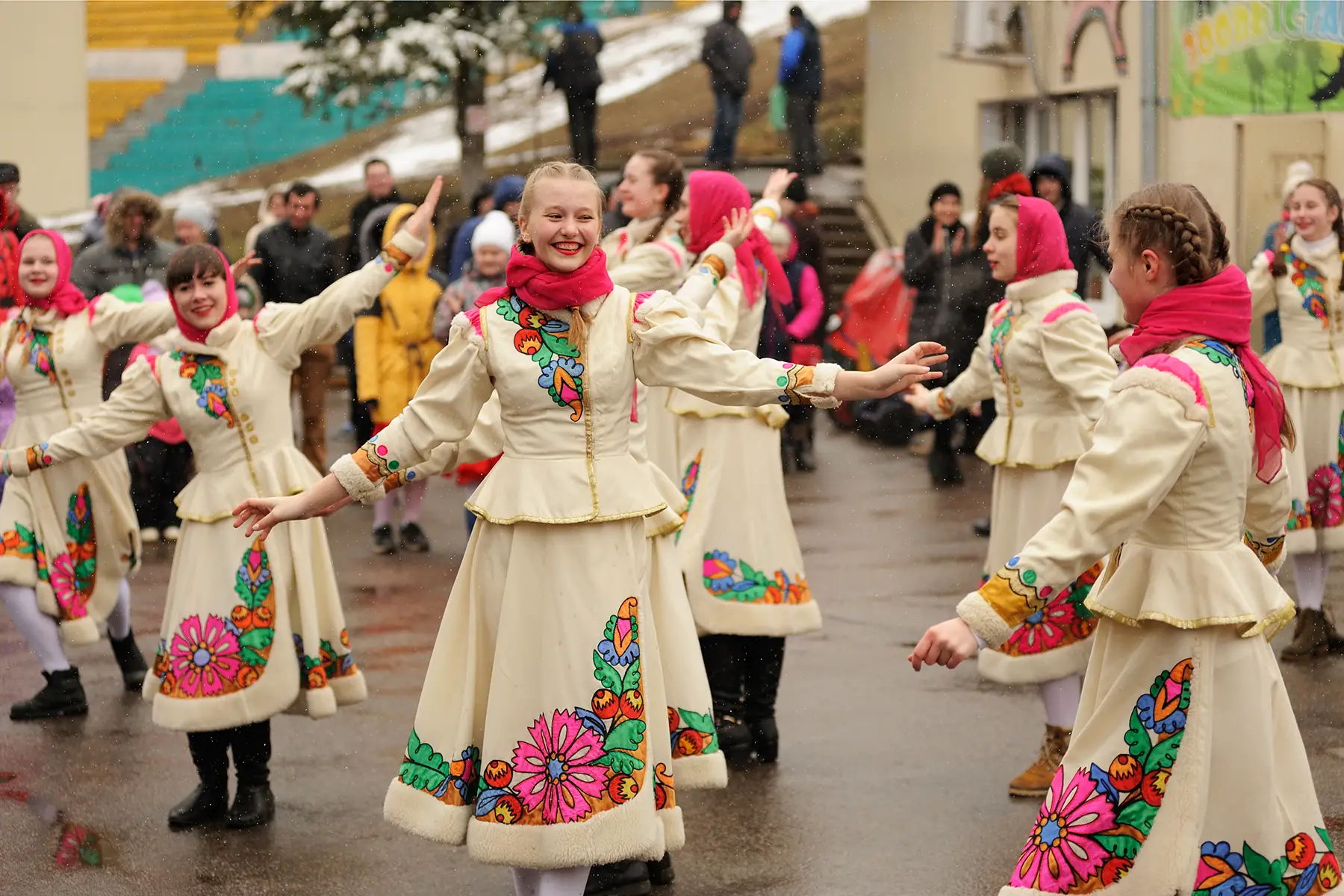
Celebrations start the night before Easter Sunday. Churches fill with lights and, at dawn, the bells ring out to announce the arrival of Easter. Everyone paints boiled eggs in bright colors and has a traditional feast. Typical Easter foods are round sweet bread as well as Easter cake served with sweetened curds, butter and raisins.
8 March: International Women’s Day
Symbolizing women’s equality, most people in Russia refer to International Women’s Day just as the eighth of March. It’s a day for celebrating women’s achievements. People have time off work, workplaces organize celebrations, and everyone gives gifts to the important women in their lives.
April: Moscow International Film Festival
The very first Moscow International Film Festival (MIFF) was in 1935 when the jury was headed up by world-renowned film-maker Sergei Eisenstein (of Battleship Potemkin fame). It became a regular event on the cultural calendar in 1959. More than 200 films from 50 different countries are screened, with the best picture winning the Golden George.
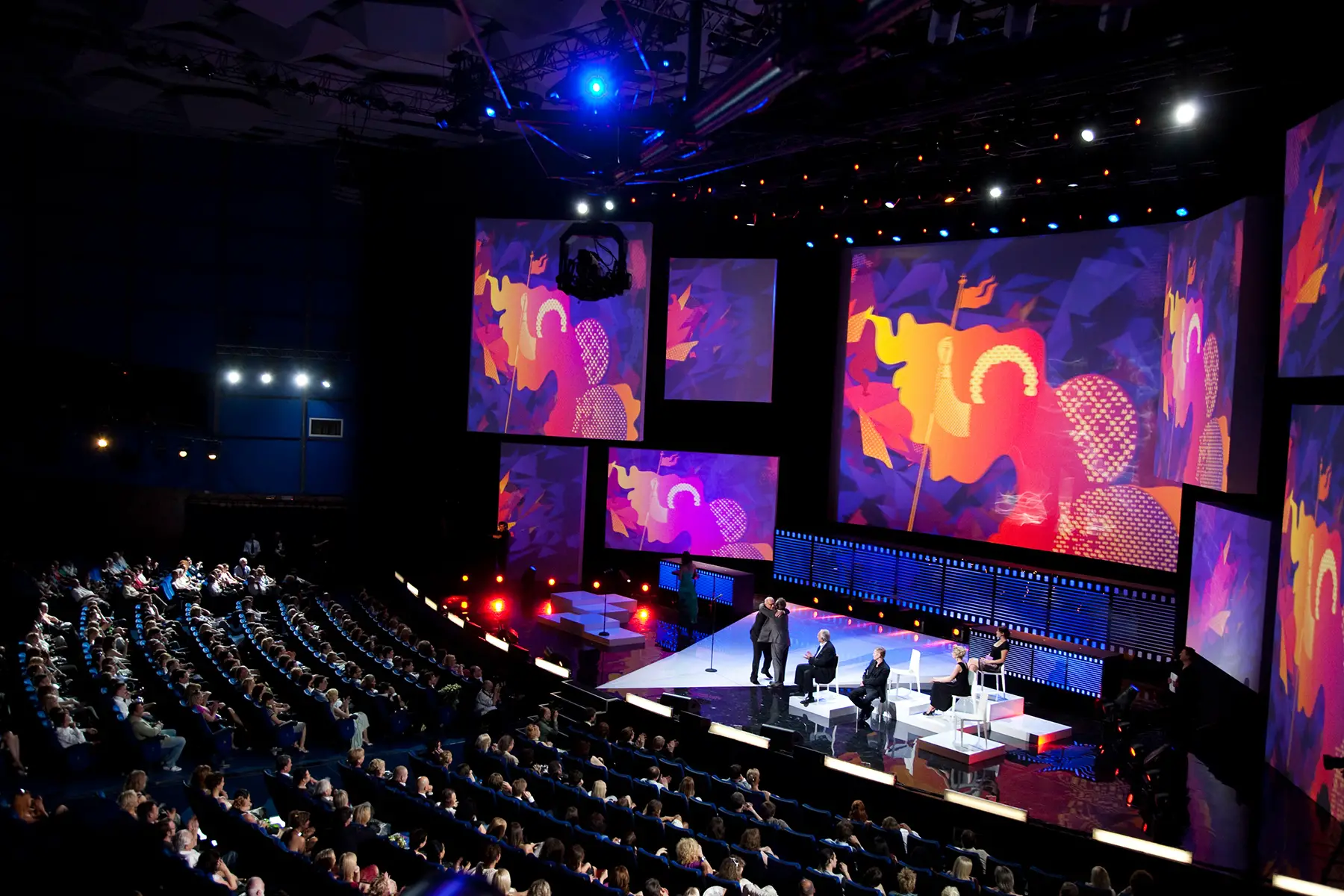
March/April: Golden Mask Theater Festival, Moscow
The Golden Mask Theater Festival is an all-Russian theater festival and competition. It covers all genres from drama to modern dance and puppet theater. The Golden Mask festivals takes place in Moscow.
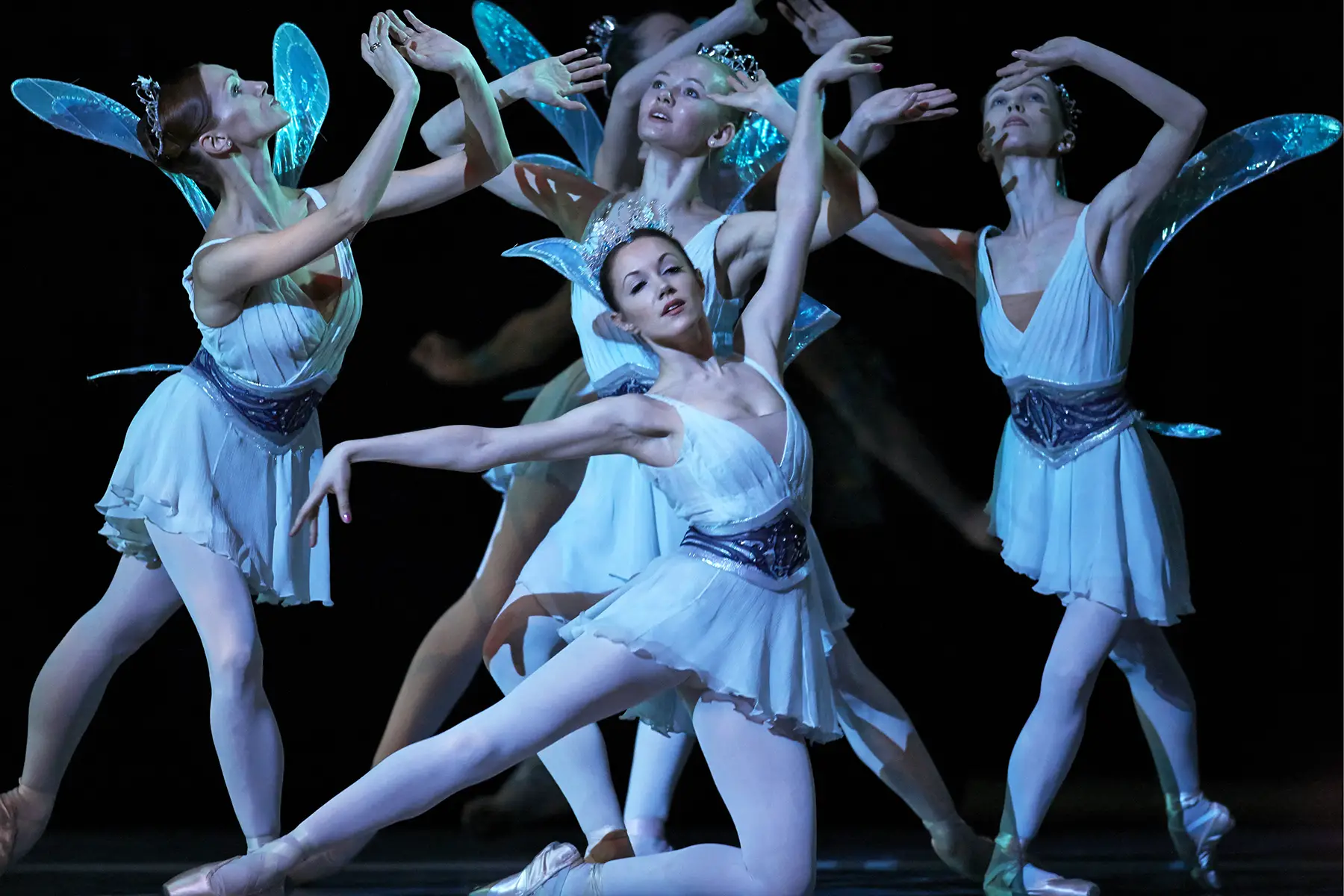
May-July: White Nights Festival, St Petersburg
Due to St Petersburg’s northerly location, the sun never fully sets in St Petersburg between May and mid-June. You can talk a walk at midnight and still see the sun on the horizon. This provides the romantic backdrop for the annual White Nights Festival, an arts festival with music and dance by Russian and international stars. The Mariinsky Theatre has a program of more than 175 operas, ballets, and classical concerts – and locals snap up tickets pretty quickly. There are carnivals, also, the best being in the suburb of Peterhof where actors dress up in historical costume from the time of Peter the Great and re-enact historical events.
9 May: Victory Day
Victory Day celebrates the end of World War II with parades, spectacular fireworks and displays of military strength. The most impressive event is in Moscow‘s Red Square, where soldiers, tanks, missiles, and other military equipment are on display on the ground while military planes fly overhead. Military memorials all over Russia are spruced up, and there are displays in museums.
June: Scarlet Sails, St Petersburg
The White Nights Festival culminates with Scarlet Sails, the largest annual public gathering in Russia with more than a million people watching a mock pirate battle on the River Neva, a firework show, and a tall ship with sails the color of blood. The event celebrates the end of the school year.
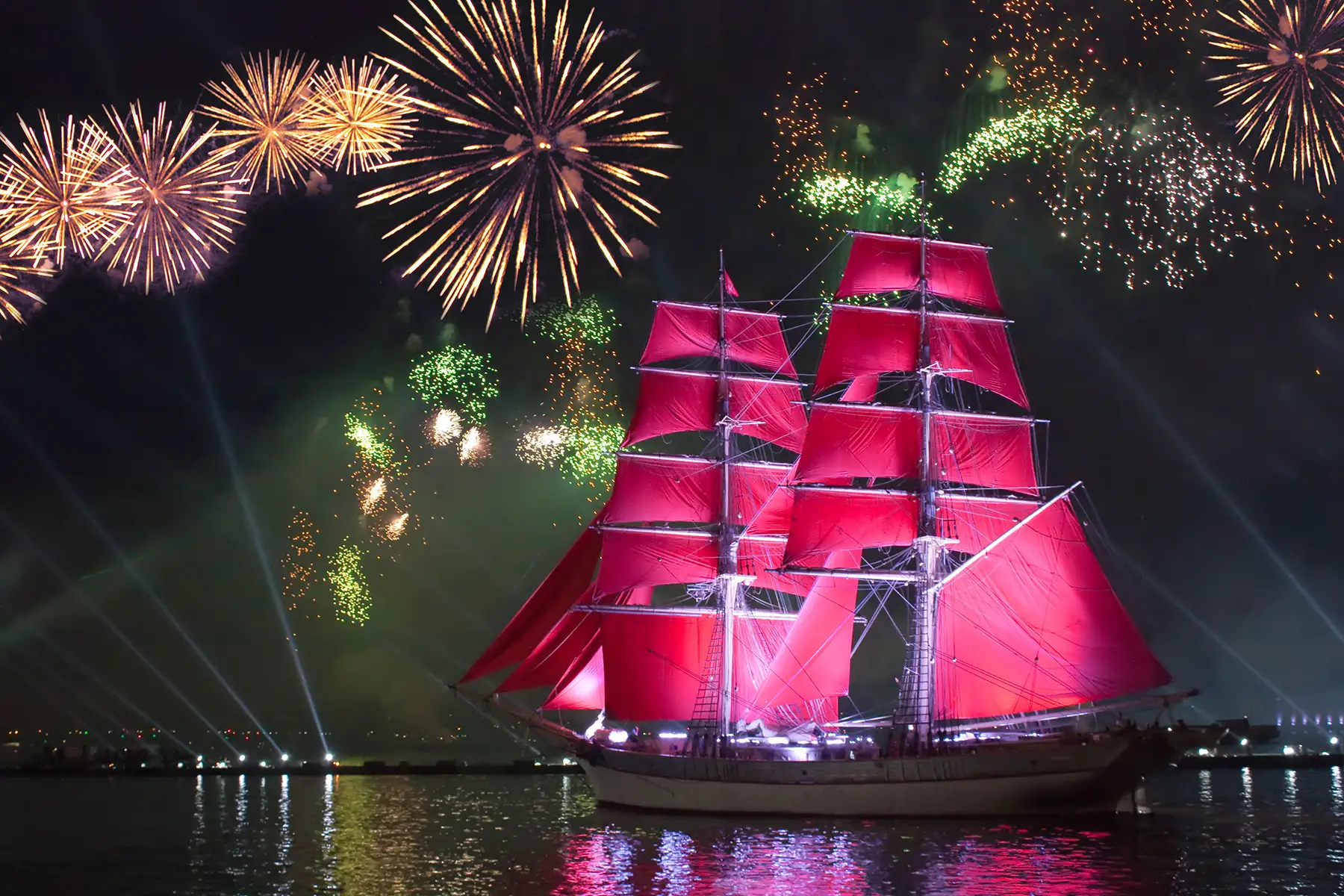
June: Ivan Kupala Night
This is a summer solstice celebration related to John the Baptist (Ivan means John and kupala is related to a Slavic word for bathing) and 23–24 June in the Julian calendar is used by the Orthodox church. Girls wear flower or herb wreaths on their heads, and in the evening the wreaths are decorated with burning candles and set afloat; the girl whose wreath travels the farthest will have the happiest year ahead, and the candle that burns the longest means a long life. People light bonfires and jump over them for good luck. Some seek a special flowering fern said to direct the finder towards treasure. There are fireworks, of course.
June: Taste of Moscow
Each year a selection of Moscow’s top restaurants opens their doors for three days of masterclasses and tasting sessions, open to all the family (there’s usually a special entertainment zone with a children’s menu). There are also zones for different types of food, drink, and music to create a party atmosphere. Around 200 different masterclasses are on offer, for both Russian and international foods.
June: Wild Mint Folk Festival
This large, open-air world folk music festival takes place in the Ethnomir complex in Moscow every summer. Over several days, Russian and international musicians perform a variety of folk-based genres – afro-beat, ethno-jazz, raga, Russian folk – and there are also food stalls, markets, and body and soul workshops.
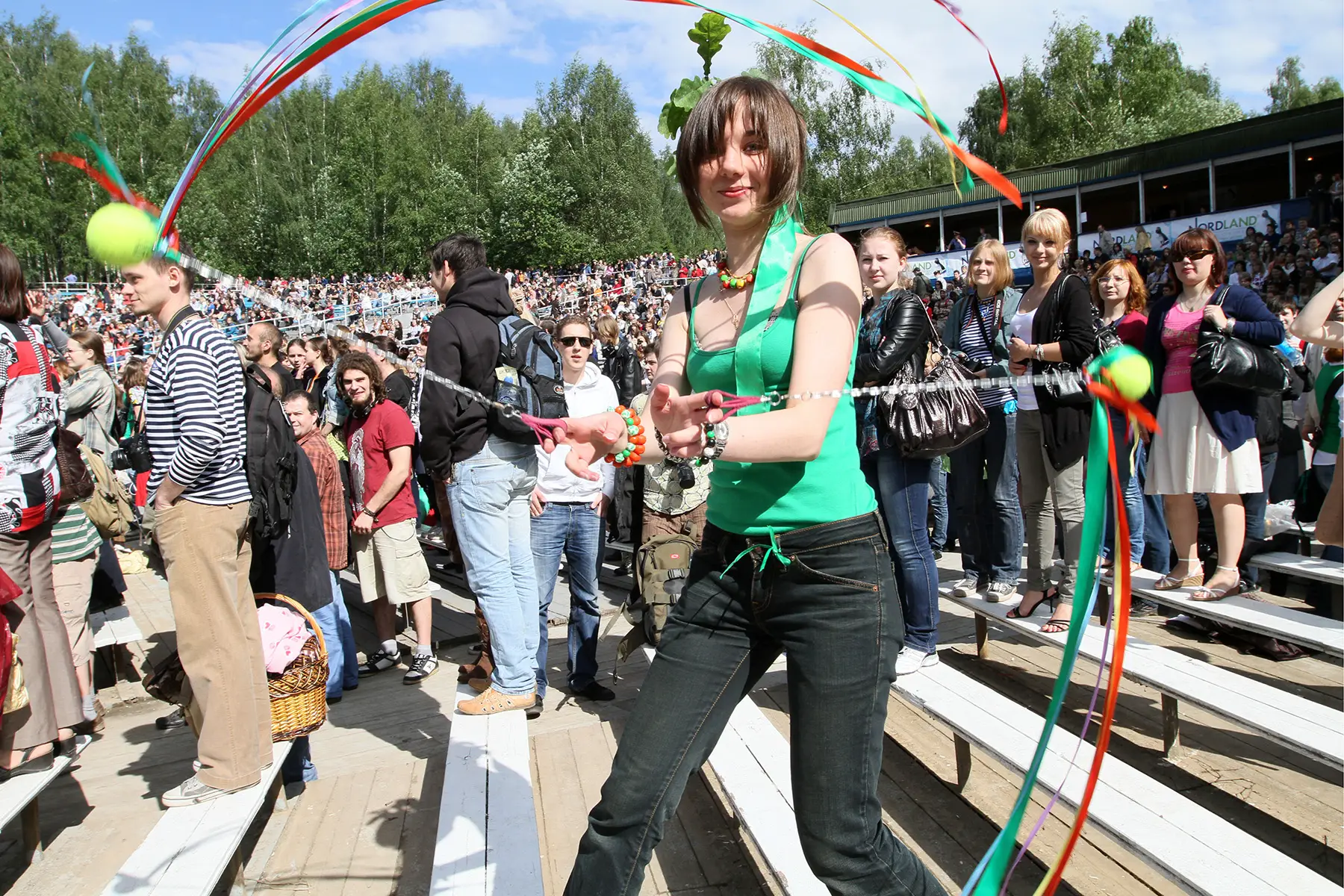
July: Nashestvie, Moscow
This big, open-air rock festival focuses on Russian rock bands. Nashestvie is organized by Russian rock station Nashe Radio (the station responsible for Russia’s major rock music chart, Chart Dozen). The festival’s name means invasion in Russian but many people call the festival the Russian Woodstock. It’s a good place to see both established and up-and-coming musicians from around Russia and neighboring states.
August: Afisha Picnic, Moscow
This may just be a one-day event but it’s one of the oldest and best-known music festivals in Russia. It’s held in the grounds of Kolomenskoye, a former Tsar’s estate on the banks of the Moscow River. It attracts big Russian and international names such as the Kaiser Chiefs, Courtney Love, Jamiroquai and Madness.
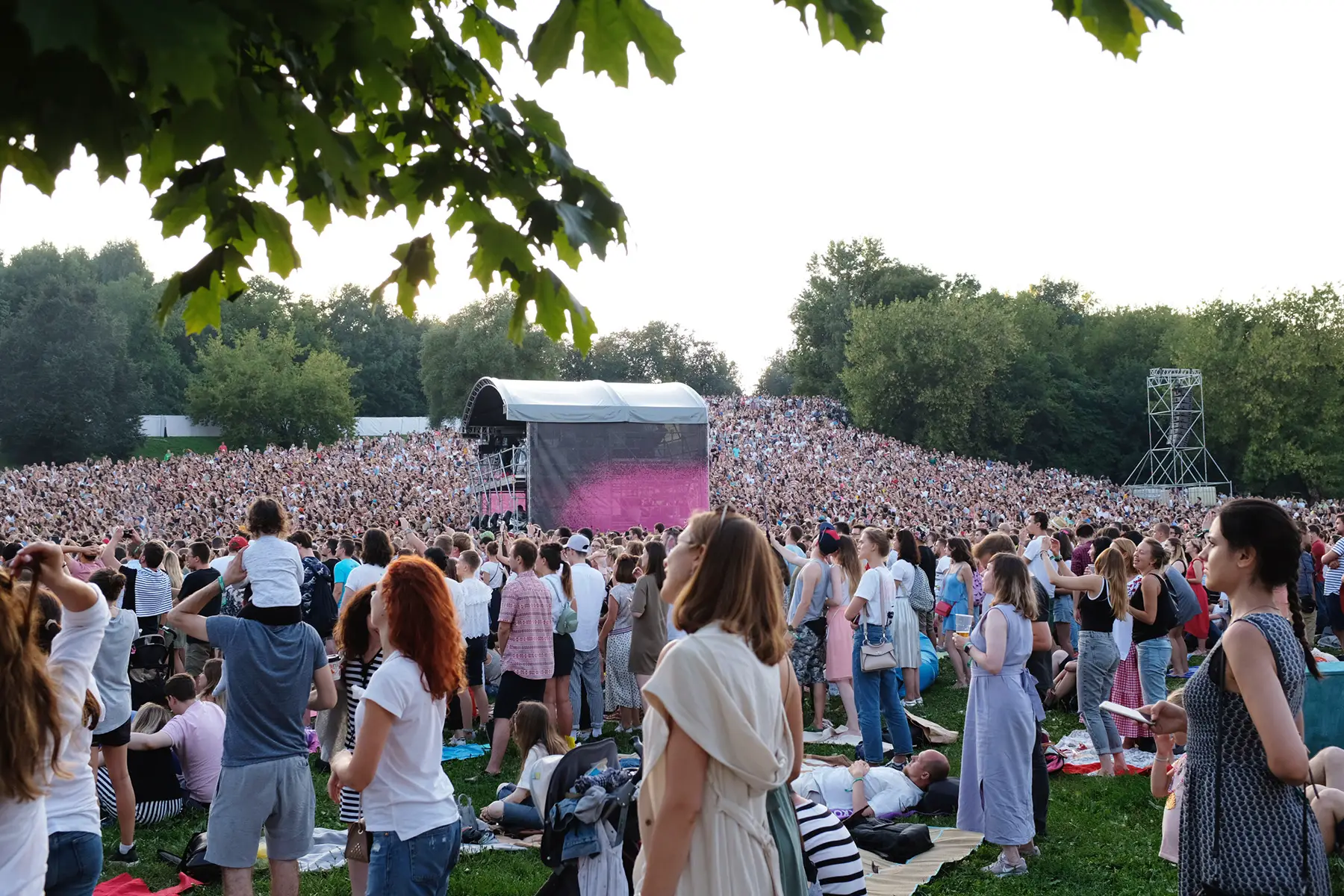
Early November: Day of Accord and Reconciliation, Moscow
There’s a big parade in Red Square and many other events, usually around the Kremlin, to celebrate the communist revolution in 1917/1918.
Mid-December to mid-January: Russian Winter Festival
All Russian cities have Winter Festivals celebrating the best of Russian culture, but the biggest and best is in Moscow. This is a huge annual event with activities all around the city, which is decked with thousands of fairy lights. In Izmailovo Park you can also watch performances of folk songs and dances, ice skate, sled or take a ride in one of the three-horse sleighs called troikas. Gorky Park is famous for its magnificent ice sculptures. In Revolution Square you can buy crafts, eat warm pancakes or bagels spread with jam or honey, listen to a balalaika concert or watch a fashion show.
December/January: New Year
As Christmas was banned for many years in Russia, many of the Christmas traditions were diverted to the New Year celebrations on New Year’s Eve on 31 December. People now decorate New Year trees instead of Christmas trees and Ded Moroz (Father Frost), accompanied by his granddaughter Snegurochka (Snow Maiden), delivers presents instead of Father Christmas. Families enjoy feasts, listen to the President’s New Year Speech and the Kremlin clock strikes midnight. Many Russians also celebrate a second New Year on 13–14 January or Old New Year, a tradition dating back to the old Julian calendar. Concerts, carnivals and street fairs – and a large ice rink in Red Square – are part of the fun.
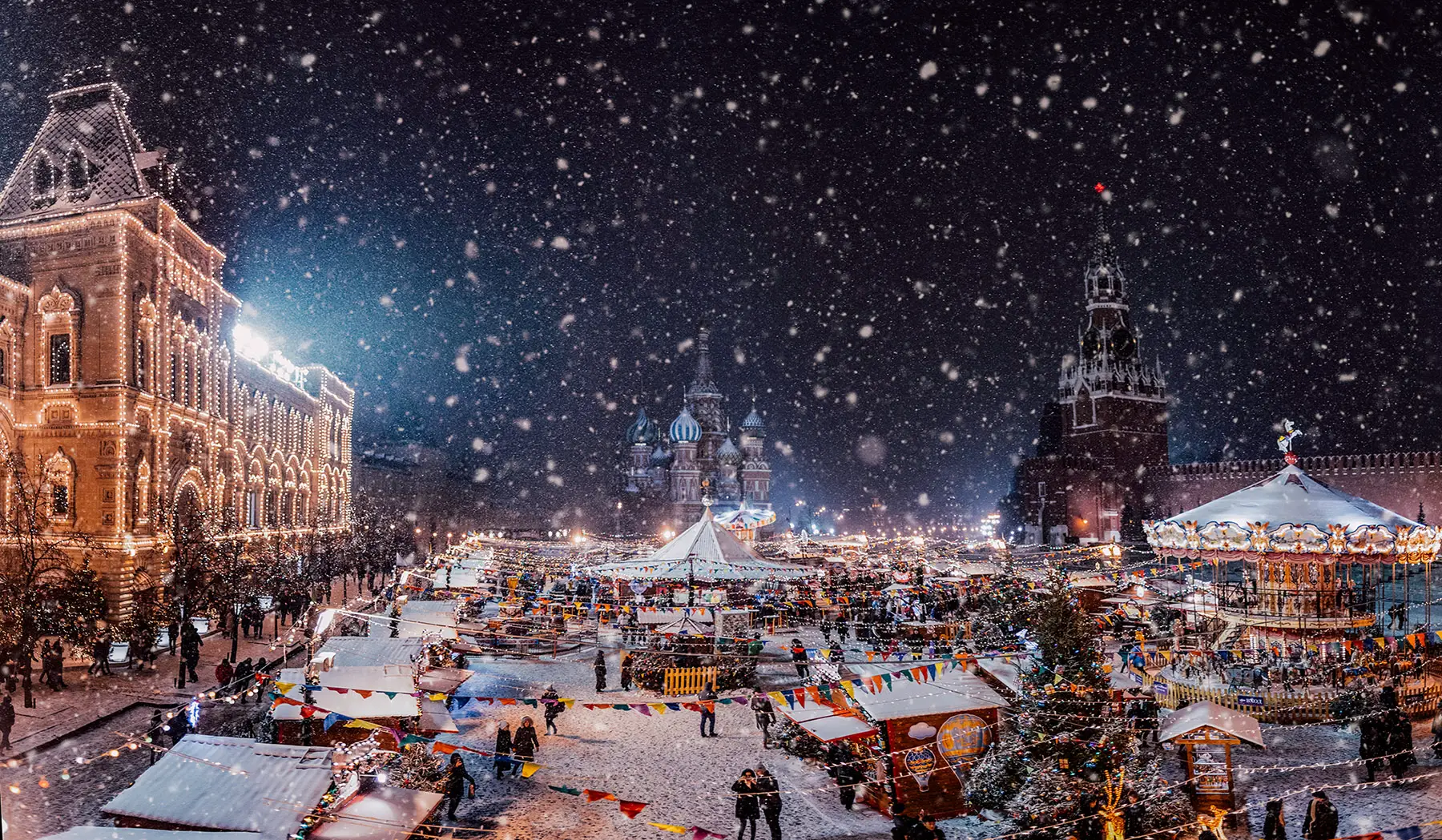
Throughout the year: Chekhov International Theater Festival, Moscow and beyond
Established in 1992 and named in honor of Russia’s most famous playwright and author, Anton Chekhov, the annual Chekhov International Theater Festival brings together theater companies from all over the world as well as Russia. There are also joint productions. Performances are primarily in Moscow but there are sometimes shows that tour other major cities such as St Petersburg and into the regions.
